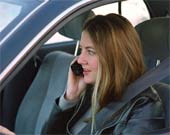10/11/2005
New York Cell Phone Ban Generates Over $50 MillionThe ban on cell phone use while driving in New York state has generated between $50 and $80 million in revenue.

In December 2001, New York became the first state to outlaw the use of cell phones by drivers, and the law has generated millions. As of July, 551,294 motorists have been billed for driving without a hands-free device -- about five percent of registered drivers in the state.
The offense carries a maximum fine of $100 and a mandatory $50 surcharge, meaning police have thus far billed motorists between $50 and $80 million. Enforcement of the law has grown sharply. Between 2002 and 2004, the number of cell phone tickets nearly tripled from 81,323 to 212,242.
Aside from the revenue collected, some question the law's effectiveness. "What we have consistently found is that in the areas that have passed a ban on the use of hand-held cell phones while driving is that there is no increase in safety," explained Eric Skrum, communications director for the National Motorists Association.
Article Excerpt:New York Code
Article 33 Miscellaneous Rules
Section 1225-c. Use of mobile telephones.
1. For purposes of this section, the following terms shall mean:
(a) "Mobile telephone" shall mean the device used by subscribers and other users of wireless telephone service to access such service.
(b) "Wireless telephone service" shall mean two-way real time voice telecommunications service that is interconnected to a public switched telephone network and is provided by a commercial mobile radio service, as such term is defined by 47 C.F.R. S 20.3.
(c) "Using" shall mean holding a mobile telephone to, or in the immediate proximity of, the user's ear.
(d) "Hand-held mobile telephone" shall mean a mobile telephone with which a user engages in a call using at least one hand.
(e) "Hands-free mobile telephone" shall mean a mobile telephone that has an internal feature or function, or that is equipped with an attachment or addition, whether or not permanently part of such mobile telephone, by which a user engages in a call without the use of either hand, whether or not the use of either hand is necessary to activate, deactivate or initiate a function of such telephone.
(f) "Engage in a call" shall mean talking into or listening on a hand-held mobile telephone, but shall not include holding a mobile telephone to activate, deactivate or initiate a function of such telephone.
(g) "Immediate proximity" shall mean that distance as permits the operator of a mobile telephone to hear telecommunications transmitted over such mobile telephone, but shall not require physical contact with such operator's ear.
2. (a) Except as otherwise provided in this section, no person shall operate a motor vehicle upon a public highway while using a mobile telephone to engage in a call while such vehicle is in motion. (b) An operator of a motor vehicle who holds a mobile telephone to, or in the immediate proximity of his or her ear while such vehicle is in motion is presumed to be engaging in a call within the meaning of this section. The presumption established by this subdivision is rebuttable by evidence tending to show that the operator was not engaged in a call. (c) The provisions of this section shall not be construed as authorizing the seizure or forfeiture of a mobile telephone, unless otherwise provided by law.
3. Subdivision two of this section shall not apply to (a) the use of a mobile telephone for the sole purpose of communicating with any of the following regarding an emergency situation: an emergency response operator; a hospital, physician's office or health clinic; an ambulance company or corps; a fire department, district or company; or a police department, (b) any of the following persons while in the performance of their official duties: a police officer or peace officer; a member of a fire department, district or company; or the operator of an authorized emergency vehicle as defined in section one hundred one of this chapter, or (c) the use of a hands-free mobile telephone.
4. A violation of subdivision two of this section shall be a traffic infraction and shall be punishable by a fine of not more than one hundred dollars.


